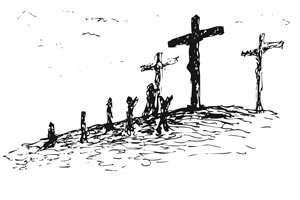
God Has Something Greater in Mind
In the book of Job, we read about God, "The measure thereof is longer than the earth, and broader than the sea" (11:9). What this means for our life and the future of this world.
I once received a greeting card that read: “God is greater than everything. His love is greater than our fear. His help is greater than our need. His hope is greater than our despair. His mercy is greater than our failure. His strength is greater than our helplessness. His consolation is greater than our injuries. His loyalty is greater than our shortcomings.”
That is what Hebrews 2:5-9 shows us: “For unto the angels hath he not put in subjection the world to come, whereof we speak. But one in a certain place testified, saying, What is man, that thou art mindful of him? or the son of man that thou visitest him? Thou madest him a little lower than the angels; thou crownedst him with glory and honour, and didst set him over the works of thy hands: Thou hast put all things in subjection under his feet. For in that he put all in subjection under him, he left nothing that is not put under him. But now we see not yet all things put under him. But we see Jesus, who was made a little lower than the angels for the suffering of death, crowned with glory and honour; that he by the grace of God should taste death for every man.”
First, God has a greater plan: “For unto the angels hath he not put in subjection the world to come, whereof we speak” (Heb 2:5).
The “world to come” (oikomenē) that Hebrews is speaking of means the coming messianic kingdom. It refers to the inhabited earth and all of humanity (Acts 17:31). The world and its future are not subject to the angels, however powerful, because they have other domains. Rather, the future earth is subordinate to humans, who are destined to rule. That isn’t yet the case, but biblical prophecy keeps this purpose in view.
God has a glorious purpose that He hasn’t lost sight of. It isn’t just a tiny portion of His Word, but is firmly anchored in it. That is why we should never lose sight of this purpose either. In Hebrews alone, we find at least six references to Jesus’ return and His coming kingdom:
– “And again, when he bringeth in the firstbegotten into the world, he saith, And let all the angels of God worship him” (Heb 1:6; cf. Rev 19:6).
– “For unto the angels hath he not put in subjection the world to come, whereof we speak” (Heb 2:5).
– “There remaineth therefore a rest to the people of God” (Heb 4:9).
– “So Christ was sacrificed once to take away the sins of many; and he will appear a second time, not to bear sin, but to bring salvation to those who are waiting for him” (Heb 9:28, NIV).
– “Not forsaking the assembling of ourselves together, as the manner of some is; but exhorting one another: and so much the more, as ye see the day approaching” (Heb 10:25).
– “For yet a little while, and he that shall come will come, and will not tarry” (Heb 10:37).
God’s greater plan is the Messiah’s reign on earth (Rev 12:10). And God included humanity in this plan; that is man’s destiny.
Second, man has a greater calling: “But one in a certain place testified, saying, What is man, that thou art mindful of him? or the son of man that thou visitest him? Thou madest him a little lower than the angels; thou crownedst him with glory and honour, and didst set him over the works of thy hands: Thou hast put all things in subjection under his feet. For in that he put all in subjection under him, he left nothing that is not put under him. But now we see not yet all things put under him” (Heb 2:6-8).
 Adam already received the order to rule over the earth: “And God said, Let us make man in our image, after our likeness: and let them have dominion over the fish of the sea, and over the fowl of the air, and over the cattle, and over all the earth, and over every creeping thing that creepeth upon the earth…And God blessed them, and God said unto them, Be fruitful, and multiply, and replenish the earth, and subdue it: and have dominion over the fish of the sea, and over the fowl of the air, and over every living thing that moveth upon the earth…And out of the ground the LORD God formed every beast of the field, and every fowl of the air; and brought them unto Adam to see what he would call them: and whatsoever Adam called every living creature, that was the name thereof” (Gen 1:26, 28; 2:19).
Adam already received the order to rule over the earth: “And God said, Let us make man in our image, after our likeness: and let them have dominion over the fish of the sea, and over the fowl of the air, and over the cattle, and over all the earth, and over every creeping thing that creepeth upon the earth…And God blessed them, and God said unto them, Be fruitful, and multiply, and replenish the earth, and subdue it: and have dominion over the fish of the sea, and over the fowl of the air, and over every living thing that moveth upon the earth…And out of the ground the LORD God formed every beast of the field, and every fowl of the air; and brought them unto Adam to see what he would call them: and whatsoever Adam called every living creature, that was the name thereof” (Gen 1:26, 28; 2:19).
The quotation, which Hebrews states as being “in a certain place,” comes from Psalm 8:5-6: “For thou hast made him a little lower than the angels, and hast crowned him with glory and honour. Thou madest him to have dominion over the works of thy hands; thou hast put all things under his feet.”
Although man is lower than the angels, according to the order of creation, God has given him dominion over the earth. He created man for it.
Yes, what is man that God even thinks of him at all? What is man that the Almighty cares for him, looks out for him, and provides for him? What is man, over whom even the slightest angel stands? God not only thinks of him, but also crowned him with glory and honor and subjected all of creation to him, without exception. Yet, through the Fall, man initially lost this claim and ceded it to Satan. The inhabited world is currently ruled by the devil and his demonic angels. God’s purpose wasn’t accomplished through Adam. That’s why Hebrews continues, “But now we see not yet all things put under him” (Heb 2:8b).
What do we see now? Chaos, sin, demonic things, abominations of all kinds, lovelessness, tyranny and dictatorship, injustice, environmental and mental (soul) pollution, mismanagement and exploitation, enslavement, bondage and addiction.
What don’t we see now? The rule of man over the future earth. But God wouldn’t be God if He didn’t also complete a work that He had begun. He doesn’t let everything continue this way until we destroy ourselves, because He has a bigger goal. And that’s where Jesus comes in.
Third, Jesus is achieving greater things: What God didn’t accomplish with Adam is now being accomplished by Jesus Christ. His death cry expressed this: “It is finished!”
From the phrase, “But now we see not yet all things put under him,” this statement follows: “But we see Jesus, who was made a little lower than the angels for the suffering of death, crowned with glory and honour; that he by the grace of God should taste death for every man” (Heb 2:9).
Here the Lord—who is declared to be God in Hebrews 1 and who is higher than any angel—is mentioned by His human name, Jesus. The incarnate Son of God, like all human beings, was abased below the angels. Angels cannot die, but He died. And now in His work and in Himself, man is again elevated to take up his lost position in the coming messianic kingdom. In the Son of Man—Jesus—God achieves His purpose for mankind.
 The Son of God became a Son of Man, abased below the angels. He suffered and died on the cross, and is now crowned with glory and honor. He has recovered everything that the first Adam lost. The first Adam was defeated by the devil, but the second Adam defeated the devil (Heb 2:14).
The Son of God became a Son of Man, abased below the angels. He suffered and died on the cross, and is now crowned with glory and honor. He has recovered everything that the first Adam lost. The first Adam was defeated by the devil, but the second Adam defeated the devil (Heb 2:14).
Through this Jesus, upon His return and the establishment of the messianic kingdom, once-fallen man will again be crowned with glory and honor, and everything will be subjected to him (Rev 20:4). His hope is greater than our despair. We have good reason not to keep our eyes on the world, but to look at Jesus.
News from Israel - 11/2020

